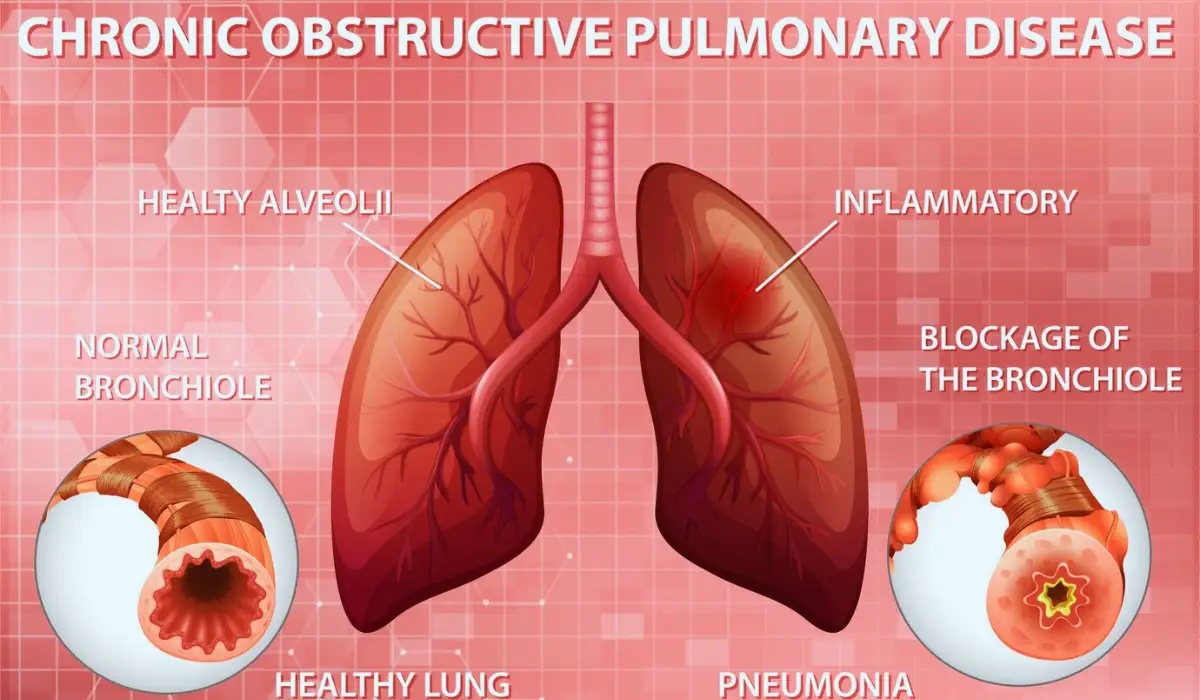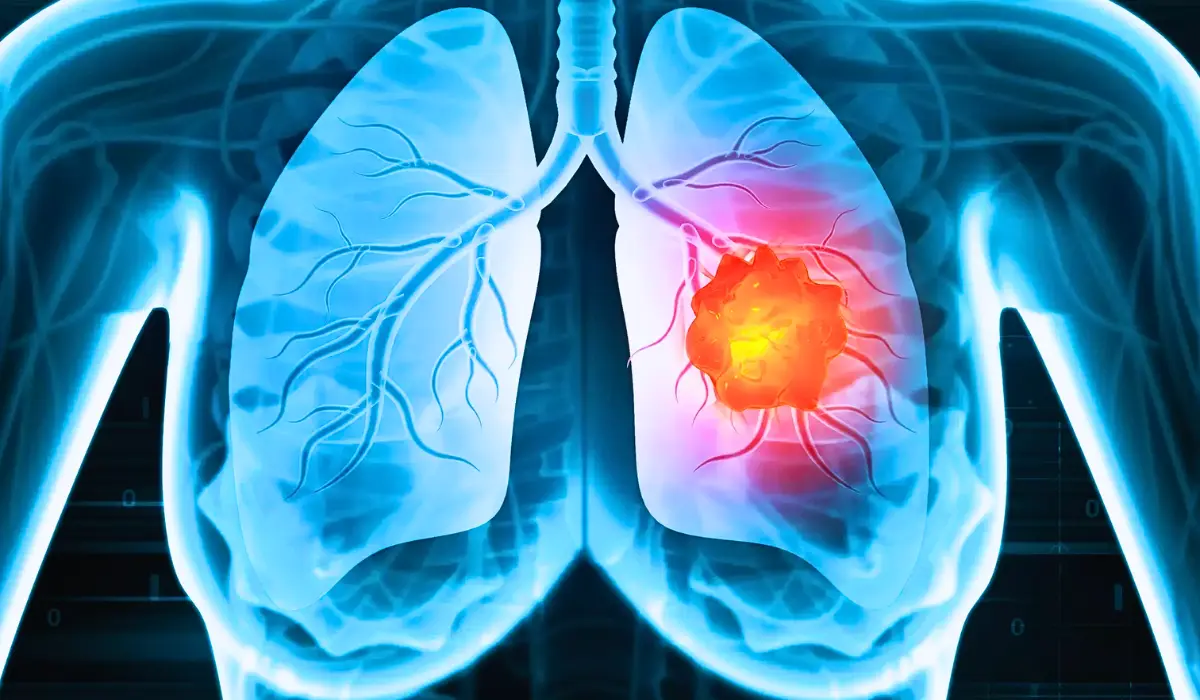There are various Respiratory Diseases that can impact your health and lung condition. Besides, respiratory diseases can vary in their severity and symptoms; some can be serious, causing a heart attack, while some of them just cause normal coughing and breathing difficulty. So, let us explore different types of respiratory diseases along with their causes and treatments.
10 Respiratory Diseases With Their Causes And Treatments
1] Asthma
Asthma is a chronic inflammatory condition where the oxygen flow to the lungs gets affected. It causes swelling of the airways, making it difficult for you to breathe in and out. Besides, there are various factors that cause Asthma; some of them are allergies to dust, animal dander, smoke pollution, physical activity, and respiratory infection.
Apart from all these, genetics can also be the reason for Asthma; if your family history mentions some with it, you may have a high chance of having Asthma. However, this disease is treatable with the inhalation of bronchodilators, corticosteroids, and anti-inflammatory medicines, which are provided by a pulmonologist.
2] Chronic Obstructive Pulmonary Disease (COPD)
Chronic Obstructive Pulmonary Disease signifies a group of respiratory diseases and another problem that involves blockage of airways from the lungs. It is caused by continuous and regular exposure to the smoke from burning fuels and smoking tobacco. Moreover, the symptoms of COPD show difficulty in breathing, coughing, mucus, and tightness in the chest.

However, there are options for the treatment of Chronic Obstructive Pulmonary Disease, in which a pulmonologist can provide you with antibiotics, bronchodilators, anti-inflammatory medications, and anticholinergics. Further, if COPD reduces oxygen levels in the blood, you may need to have a portable oxygen tank with you.
3] Bronchiectasis
In this condition, your lung tubes that take the air to them get damaged by getting widened or forming pouches. This can make it difficult to clear out mucus from your lungs, which can cause infection. However, Bronchiectasis is divided into types, which are Cylindrical and Cystic, among which Cylindrical Bronchiectasis is the most common and not that serious. However, Cystic bronchiectasis is a more serious form that needs urgent medical attention.
It can be caused by respiratory infection, chronic inflammation, or immune system disorder. Bronchiectasis disease can be treated with antibiotics for managing infection, mucus-clearing techniques, and physical therapy, and in severe conditions, surgery can be done.
4] Bronchitis
Bronchitis is a condition that is mostly caused by viral infection of the lungs, and if the infection is not too dangerous, then the disease is expected to go away by itself without any treatment. Moreover, other causes for this condition can be excessive smoking and continuous exposure to pollution.
Further, Bronchitis has symptoms like shortness of breath, Fever, runny nose, and fatigue. Thus, the treatments for this respiratory disease can be antiviral medications, anti-inflammatory medications, Cough suppressants, and Bronchodilators.
5] Pulmonary Fibrosis
Pulmonary Fibrosis is a condition where your lungs get stiff and scarring, making it hard for the lungs to function the right way. This disease can cause shortness of breath, dry cough, and chest pains. Moreover, Pulmonary Fibrosis is caused due to exposure to silica dust, asbestos dust, autoimmune diseases, and radiation therapy. Further, the treatment options that are available for Pulmonary Fibrosis include medications like corticosteroids, immunosuppressants, breathing exercises, and lung transplants in severe cases.
6] Sarcoidosis
This respiratory disease involves the formation of granulomas in various organs, including the lungs. The causes of this disease are not known exactly, but medical experts and pulmonologists believe that it might be due to exposure to dust, chemicals, viruses, and bacteria.
For the treatment of Sarcoidosis, the most common option chosen by pulmonologists is corticosteroids. Apart from this, other options are biological agents, Disease-modifying antirheumatic drugs (DMARDs), and antimalarial agents.
7] Lung Cancer
Lung cancer is a serious respiratory disease that is caused by uncontrolled cell division in your lungs. Factors that can trigger this in your lungs are smoking and exposure to carcinogens such as asbestos and radon. Besides, with lung cancer, you can feel chest pain, difficulty in breathing, and coughing blood.

Furthermore, if lung cancer is not treated on time, it can worsen the condition and cause severe damage to the lungs. Hence, Lung cancer can be treated with chemotherapy, radiation therapy, and immunotherapy. Moreover, the treatment of lung cancer can vary according to its stage and type.
8] Pneumonia
Pneumonia is a respiratory disease that is caused mostly by infections from bacteria, viruses, parasites, or fungi. Moreover, the disease has symptoms that cause difficulty in breathing, fever, and yellow, green, or bloody mucus. Also, bacterial Pneumonia is more serious than viral Pneumonia because it tends to go away by itself. The treatment available for Pneumonia disease is generally antibiotics; however, antifungal and anti-infection medication may be prescribed by the pulmonologist according to the type of Pneumonia.
9] Pulmonary Edema
Pulmonary Edema is often caused by a collection of fluids in the lungs, which can happen due to kidney failure, heart failure, or severe lung infections. Besides, inhalation of toxin gases and certain medications can also cause Edema. The symptoms of this respiratory disease can be mild, such as difficulty in breathing, to serious situations like heart attack. The treatment can be oxygen delivered through prongs in your nose, medication for frequent urination, ventilators, or respirators that can blow in air through a tube inserted into your windpipe.
10] Influenza (“The Flu”)
Influenza is a respiratory disease that is caused by influenza viruses. This disease can lead to severe conditions. Besides, influenza is divided into three types: A, B, and C, among which A and B are seasonal with more severe symptoms, and C is not seasonal with no severe symptoms.
The treatment for influenza includes anti-viral medications to reduce the severity of the disease. Besides, vaccines are also available to treat and prevent influenza.
Conclusion
These were some respiratory diseases explained with their causes and treatments. Some respiratory diseases, such as Pulmonary disease and lung cancer, can be severe, causing heart attacks. While diseases like asthma can only cause difficulty in breathing. So, whether you are suffering from any respiratory disease, make sure to consult with a pulmonologist.
References
- World Health Organization https://www.who.int/gard/publications/The_Global_Impact_of_Respiratory_Disease.pdf
- Khaltaev N., Axelrod S. Chronic respiratory diseases global mortality trends, treatment guidelines, lifestyle modifications, and air pollution: preliminary analysis. J Thorac Dis. 2019;11(6):2643–2655. doi: 10.21037/jtd.2019.06.08. [PMC free article]